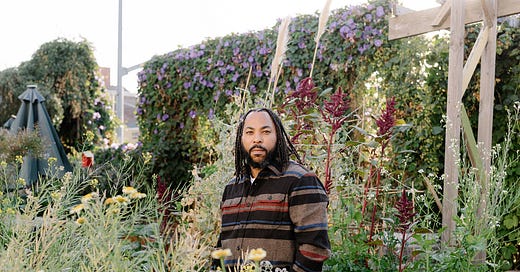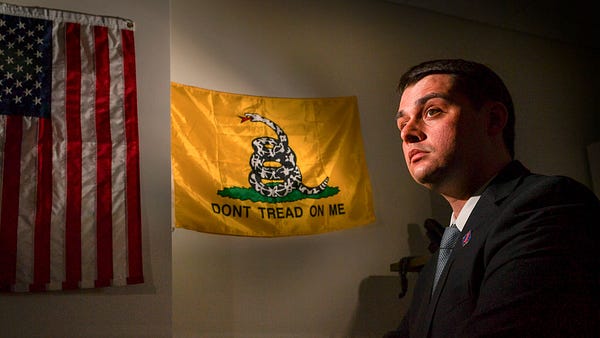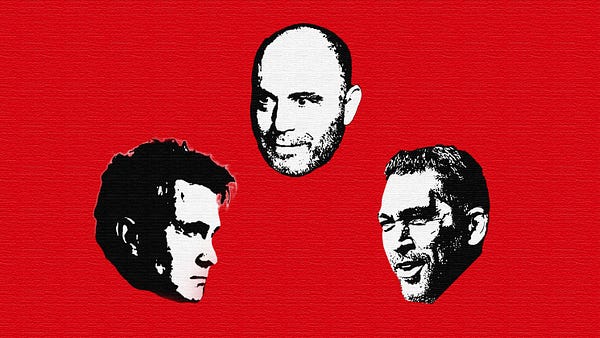
The Free Press

Cardboard boxes of fresh yellow squash sit on a table outside the Bottoms Up Community Garden in Oakland, California.
Seneca Scott said “meet me at my office,” and this lush spot at the corner of 8th Street and Peralta—home to songbirds and clucking chickens—is it.
A few minutes later, Scott, 44, drives up in his Jeep and hops out wearing pajamas, a down vest, and a wide grin. We sit at the picnic table in the morning light of the garden, Scott stroking his beard, his shoulder-length locks tied up, as he describes how crime is ruining his adopted hometown.
He says it’s ridiculous how criminals are taking advantage of the police force’s notoriously slow response times.
“You know in the movies when they go to rob a bank and set their watches, like ‘all right bro, we got 30 seconds aaaand synchronize,’ ” Scott says. “Now it’s like 45, 50 minutes. It’s insane. I can sit down and make a sandwich and shit. Smoke a cigarette, take selfies, walk home. Because the police aren’t coming. They’re not even picking up.”
From 2018 to 2022, the number of homicides in Oakland has jumped by 79 percent after falling by 46 percent in the six years prior. In the last year alone, violent crime has risen by 17 percent.
Oakland now has the state’s second-worst 911 response time. Residents say they have waited 10 minutes before anyone even picked up the phone. Meanwhile, the number of homicides that result in charges has dropped from 65 percent in 2019 to 36 percent in 2022.
“Anyone who has the ability is making an exit plan,” said Scott. “Like, you’re in a country going to war soon and people are looking at it like, how do we get out? That’s what it feels like.”
In the past few years, Scott has become the city’s own version of his Roman philosopher namesake—speaking truth to power—for a growing number of Oakland residents sick of crime and a smug political class that has not only failed to do anything about it, but ushered it in.
You might think a black activist and union organizer in the Bay Area would be a progressive who supports Black Lives Matter and defunding the police, but Scott rejects both movements. In fact, he says the defund debate is split along racial lines.
“The black people who live in the impacted neighborhoods were pretty much united in the fact that they did not want to cut the police budget,” he says. “The white people in affluent neighborhoods were pretty much united in that they did want to.”
Scott calls himself a “post-partisan solutionary.” Though he used to be a leftie, he now unabashedly calls out “phony” progressives on Twitter (now X) for being “dismissive towards Black and Brown people.” He says he doesn’t do left-right politics and told me that both parties now cater to elites.
That’s why Scott has started the nonprofit Neighbors Together Oakland.
“We’re building a multiracial, multi-class coalition. We’re not using race as a divider, but as a uniter,” said Scott. “The Democrats wrongly demonize everybody who’s a white man or say every single thing that’s wrong with society is white supremacy. It’s bullshit. But they’re doing it on purpose because they know if rural white people and inner-city black people ever started voting together, we would be able to take our republic back.”

Scott has activism in his blood. His father was cousin to Coretta Scott King, the wife of Martin Luther King Jr. After growing up in Cleveland, Ohio, he moved to Oakland in 2012, where he now works as a union organizer and runs the community garden.
Last year, Scott ran for mayor, in part because of his own direct experience with crime.
At around 10 p.m. on October 30, 2021, Scott got a call warning him that two men were in his garden trying to steal the water heater. When he went down to check it out, he found two guys had set up a tent and laid drugs out on his picnic table.
When Scott told them to put down the water heater, one of the guys pulled a knife. Scott showed the men his Heckler & Koch USP45 Compact pistol and again told them to put down the water heater. One of the guys took off.
At that moment, two Alameda County police officers passed by in their cruiser and the remaining intruder flagged them down. He told the officers Scott had pulled a gun on him and his friend. The officers saw the handle of Scott’s pistol sticking out of his vest pocket and, according to the police report, they took the gun and arrested Scott on charges of brandishing a weapon and carrying a concealed firearm.
“I had a firearm ’cause I came down knowing I was going to encounter two thieves, and I showed it to them,” Scott said. “It’s unfortunate that we’re forced to self-help right now. Just that same night, an hour earlier, my neighbor was shot in his face while holding his baby. That was on the same street, like eight houses down. There’s no rule of law.”
Two of the three gun charges, all misdemeanors, were dropped this April. The third was later dropped, too, though Scott is still mad he never got his gun back. Gun or no gun, the incident did push him into local politics.
Though Scott lost his 2022 mayoral campaign, he is focused on forming a new party filled with nontraditional, nonpartisan political candidates.
“I’m post-partisan. I don’t go left or right. I go up and down,” says Scott, who is not married and has no children. “Either you have integrity and solutions or you don’t.”

Scott first ran for elected office in Oakland in 2020, vying for a seat on its city council. At the time, he supported the idea of defunding the police, but soon changed his mind.
“I said, ‘I know what’s best for you because I’m smarter and I went to fucking Cornell,’ ” he reflected. “But 2020 is when I realized how deep the damage was. How the people we had put in place were just complete frauds. And that we had no connection to the people who live in Oakland. No endearment to the people who live here, and no plan to ever even listen to them. We were here to dictate to them what we think is going to create a utopian society for all of us, because again, we’re better and smarter than you are.”
Though he lost that first election, he sued the city in 2021 after the council voted to remove homeless encampments after six months but failed to enforce the policy. “Oakland no longer has a homeless problem in the traditional sense,” he says. “Yes, there are still many people who are homeless because they are poor, but the majority are now drug addicts and drug tourists.”
That same year, in the wake of Black Lives Matter protests over George Floyd’s death, city leaders voted to defund the police, slashing the force’s budget by $18 million over the next two years.
One of the city’s leading voices in the defund movement was council member Sheng Thao, who went on to become Oakland’s mayor. Now, Scott says, “our crime labs don’t work. We have to go out and subcontract to other places to do DNA tests or fingerprint tests. And sometimes they deny us.”
He adds, “We used to have the best CSI in the state.”
For years, Oakland was a booming up-and-coming city, considered the “next big tech hub” of the Bay Area. Now it’s one of the most troubled cities in California. A recent poll found 57 percent of respondents don’t visit downtown because they don’t feel safe. Oakland is one of the only major sports towns in the country to lose all its teams: the NFL’s Raiders and NBA’s Golden State Warriors have gone, while MLB’s Oakland Athletics will likely move to Las Vegas by 2025.
Mayor Thao has faced fierce public opposition to her crime policies. She first angered Oakland residents by firing a police chief amid a crime wave; seven months later, she has yet to name a successor. Then in May, Thao said she wanted to reduce the number of full-time police officers by 93, thinning their ranks from 803 to 710.
Meanwhile, her progressive district attorney Pamela Price has been reluctant to prosecute murderers, even for triple homicides. In November 2021, two gang members allegedly killed a 23-month-old toddler, and Price successfully pushed for a lower sentence, making the men eligible for parole if convicted. (Both men have been charged in the murder and appeared in court in June.)
In July, the Oakland NAACP urged city leaders to declare a state of emergency over the crime wave that has hit African Americans hardest, while accusing Price, who is black, of anti-police rhetoric and an “unwillingness” to prosecute criminals. In return, a spokesman for Price expressed “disappointment” that “a great African-American organization would take a false narrative on an important matter.”
In response to accusations that she is soft on crime, Price said, “That’s racism. I’m calling it for what it is.” (On Friday, Price’s laptop was reportedly stolen after her car was burgled on an Oakland street.)
Voters aren’t falling for Price’s spin. Less than a year after her 2022 election, she now faces a recall effort. Earlier this month, Alameda County approved a petition to collect 73,195 signatures by March, which, if successful, will trigger a special election. (The Alameda County Board of Supervisors is now considering overhauling how it conducts such elections, including raising the number of required signatures to 93,000.)
“We submitted our petition, they approved our petition for circulation, and then they decided they wanted to change the rules,” said Brenda Grisham, one of the leaders of the recall effort, who declined to say how many signatures they already have, but said she is not worried about it.
“We’re doing very well. We’re doing exceptionally well.”

Seneca Scott got into politics by learning how to fight, beating up bullies and standing up for friends. When he was a kid, he was tormented for being partially deaf, he told me, but it taught him to “step up and be the guy.” He says he’s not sure how his life would have turned out if he didn’t have a disability.
“Until fourth grade, I never knew I was different. All my friends lived in my neighborhood in Cleveland, Ohio, and we had a great childhood. Then when I started getting mercilessly bullied, all my friends who I thought cared for me joined in. Kids get scared. They don’t wanna be next,” he said.
Scott eventually grew to his current size of 5 feet, nine inches and 180 pounds, making him the biggest kid in his class. “I started beating up the bullies and created a bully-clear environment where we could all be nice to each other.”
In 1995, his family left Cleveland’s inner city to escape the crack epidemic. He found himself in a vastly superior school district, suddenly aware of the effect that property taxes and redlining have on education. He went on to get a degree in industrial and labor relations at Cornell, and became the East Bay director for the labor union SEIU Local 1021 when he moved to Oakland in 2012.
Now, through his nonprofit Neighbors Together, Scott aims to find 100 nontraditional candidates like himself and help them get elected to local offices on city councils and school boards across America. Afterward, he plans to help that same group run for higher positions like mayor or state legislator.
“Then and only then would you name your party,” Scott says. “It has to remain decentralized, and it has to remain asymmetrical because that’s what revolutions are. A political third party being a legitimate threat to a duopoly. . . is a revolution.”
He believes Oakland is ground zero for this sea change because it’s a small enough working-class city based in California, the home of progressive politics. He compares his hometown to Bakhmut, the Ukrainian city where much of the fighting against Russia has taken place.
“More people should realize that Oakland is America’s Bakhmut,” he says. “If we can stop it here and turn the tide, we can do it for the rest of America.”
David Josef Volodzko is a writer and journalist. Follow him on Substack, and read his last Free Press piece, “My Family Was Hunted by Nazis. But I Was Fired For ‘Defending Hitler.’ ”
To support more of our work, become a Free Press subscriber today:















Smart guy. Inspiring article.
American hero.